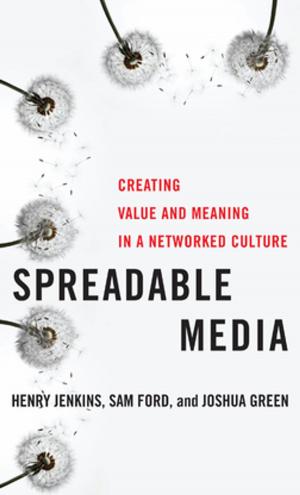Make Art Not War
Political Protest Posters from the Twentieth Century
Nonfiction, Art & Architecture, General Art, Art History, American, Popular Culture| Author: | ISBN: | 9781479815234 | |
| Publisher: | NYU Press | Publication: | November 1, 2016 |
| Imprint: | NYU Press | Language: | English |
| Author: | |
| ISBN: | 9781479815234 |
| Publisher: | NYU Press |
| Publication: | November 1, 2016 |
| Imprint: | NYU Press |
| Language: | English |
An extraordinarily visceral collection of posters that represent the progressive protest movements of the twentieth Century.
Two of the most recognizable images of twentieth-century art are Pablo Picasso’s “Guernica” and the rather modest mass-produced poster by an unassuming illustrator, Lorraine Schneider “War is Not Healthy for Children and Other Living Things.” From Picasso’s masterpiece to a humble piece of poster art, artists have used their talents to express dissent and to protest against injustice and immorality.
As the face of many political movements, posters are essential for fueling recruitment, spreading propaganda, and sustaining morale. Disseminated by governments, political parties, labor unions and other organizations, political posters transcend time and span the entire spectrum of political affiliations and philosophies.
Drawing on the celebrated collection in the Tamiment Library’s Poster and Broadside Collection at New York University, Ralph Young has compiled an extraordinarily visceral collection of posters that represent the progressive protest movements of the twentieth Century: labor, civil rights, the Vietnam War, LGBT rights, feminism and other minority rights.
Make Art Not War can be enjoyed on aesthetic grounds alone, and also offers fascinating and revealing insights into twentieth century cultural, social and political history.
An extraordinarily visceral collection of posters that represent the progressive protest movements of the twentieth Century.
Two of the most recognizable images of twentieth-century art are Pablo Picasso’s “Guernica” and the rather modest mass-produced poster by an unassuming illustrator, Lorraine Schneider “War is Not Healthy for Children and Other Living Things.” From Picasso’s masterpiece to a humble piece of poster art, artists have used their talents to express dissent and to protest against injustice and immorality.
As the face of many political movements, posters are essential for fueling recruitment, spreading propaganda, and sustaining morale. Disseminated by governments, political parties, labor unions and other organizations, political posters transcend time and span the entire spectrum of political affiliations and philosophies.
Drawing on the celebrated collection in the Tamiment Library’s Poster and Broadside Collection at New York University, Ralph Young has compiled an extraordinarily visceral collection of posters that represent the progressive protest movements of the twentieth Century: labor, civil rights, the Vietnam War, LGBT rights, feminism and other minority rights.
Make Art Not War can be enjoyed on aesthetic grounds alone, and also offers fascinating and revealing insights into twentieth century cultural, social and political history.















